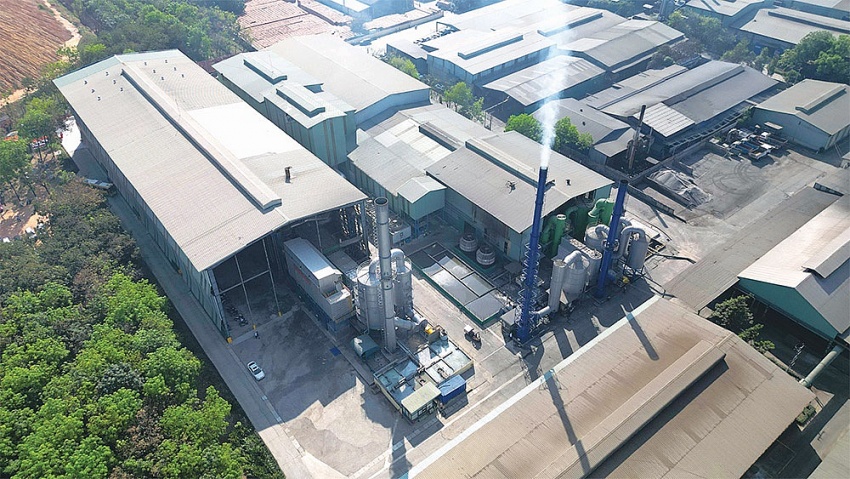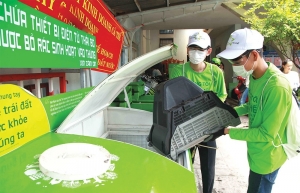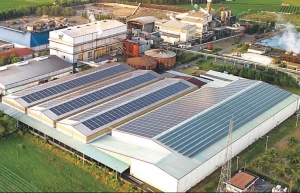Investors grapple with PPP waste projects
Haiphong Economic Zones Management Authority is set to begin the process of selecting investors for a waste-to-energy scheme in the northern port city. The project will cost VND2.5 trillion ($100 million) and covers over 10 hectares in the city’s Dinh Vu-Cat Hai Economic Zone.
 |
| Investors grapple with PPP waste projects, photo Le Toan |
Featuring two incinerators, two emission processing facilities, and one turbine for electricity generation, the plant will have a daily processing capacity of 1,000 tonnes of domestic waste to generate 20MW of power. It will have a duration of 30 years from the date of signing the land lease, and Haiphong authorities want it to come into operation in December 2025.
Le Trung Kien, director of Haiphong Economic Zones Management Authority, said that the city expects it to be a key project for Haiphong. “We offer the opportunity for both domestic and foreign investors to develop it. To select a prestigious investor, the city is calling for consultant contractors to build a bidding document model and then select potential ones,” Kien said. “We have published the information about the bidding on the national bid network and will complete the bidding document to select the consultant contractors soon.”
Other localities such as Tien Giang, Binh Thuan, Danang, Phu Quoc, and Khanh Hoa are calling for investors to implement waste treatment projects. Tien Giang is looking for developers for its $26.3 million Tan Lap 1 plant, which would be the largest of its kind in the Mekong Delta province. Under a plan approved by the provincial people’s committee, the facility will cover 13.66ha on an existing landfill in Tan Phuoc district, with a designed capacity of 750 tonnes of waste per day. The project will be implemented over 50 years.
Besides this, Tien Giang also has plans to organise bidding to select investors for the Long Chanh solid waste treatment plant. Some interested domestic parties are paying attention, and expect that the province will consider extending the construction timeline for ventures and have a mechanism to support investment.
Current ventures are operated by a public-private partnership (PPP) model, in which the state will be responsible for establishing the buried area and hiring operational units. Private investors will be responsible for collecting and treating waste.
While private sector participation can bring effectiveness thanks to investment in modern equipment and professional management process, the process suffers from some barriers during the process.
“Awareness about the importance of PPPs is only focused on central offices, which have experience in implementing them. However, the awareness and managing capacity at the local level is limited,” said Nguyen Viet Long, consulting partner at EY Consulting Vietnam in May.
Localities also face difficulties in building facilities, appraising investors’ financial capacity, and are also disadvantaged in building up and managing PPP contracts.
“In addition, the legal framework for collecting, delivering, and recycling waste has yet to be completed. There is a lack of detailed guides relating to the economic and technical norms and the price units to collect, deliver, and treat waste,” Long added.
The Ministry of Natural Resources and Environment is coordinating with authorised agencies of the Ministry of Planning and Investment, and other relevant ministries and sectors to review activities for domestic solid waste treatment facilities as a basis for detailed instructions on investment according to the PPP method in household solid waste treatment.
As of the end of 2023, Vietnam had over 1,700 solid waste treatment facilities, including 467 incinerators, 38 compost production lines, and about 1,200 landfills. Some treatment complexes or treatment facilities have applied incineration combined with energy recovery to generate electricity or incineration combined with landfill and composting.
Vietnam currently has four waste-to-power plants operating, and another 15 facilities being constructed. In January, a high-tech facility was inaugurated in Thuan Thanh township in the northern province of Bac Ninh.
The plant, involving cooperation between Thuan Thanh Environment JSC and Japan’s JFE Engineering Corporation, has a total investment of $74 million, a capacity of 600 tonnes of solid waste, and generation of 13.5MW of electricity daily. It is estimated that it will add about 100 million kWh each year to the national grid.
 | Businesses to tackle waste recycling model There are only three months left for various producers and importers to come to terms with a new waste recycling regulation overhaul. |
 | Pricing switch up ahead for solid waste and biomass The Ministry of Industry and Trade is to publish a new pricing framework applicable to refuse and biomass power plants, with a possibility that Vietnam Electricity will negotiate the purchase price using this framework. |
 | Obstructions bemoaned in treating industrial waste Manufacturers in industrial parks are facing obstructions in collectively treating and exchanging industrial waste, especially when it comes to tax. |
What the stars mean:
★ Poor ★ ★ Promising ★★★ Good ★★★★ Very good ★★★★★ Exceptional
Related Contents
Latest News
More News
- Vietnam, New Zealand seek level-up in ties (February 19, 2026 | 18:06)
- Untapped potential in relations with Indonesia (February 19, 2026 | 17:56)
- German strengths match Vietnamese aspirations (February 19, 2026 | 17:40)
- Kim Long Motor and AOJ Suzhou enter strategic partnership (February 16, 2026 | 13:27)
- Haiphong welcomes long-term Euro investment (February 16, 2026 | 11:31)
- VIFC in Ho Chi Minh City officially launches (February 12, 2026 | 09:00)
- Norfund invests $4 million in Vietnam plastics recycling (February 11, 2026 | 11:51)
- Marico buys 75 per cent of Vietnam skincare startup Skinetiq (February 10, 2026 | 14:44)
- SCIC general director meets with Oman Investment Authority (February 10, 2026 | 14:14)
- G42 and Vietnamese consortium to build national AI infrastructure (February 09, 2026 | 17:32)

 Tag:
Tag:
















 Mobile Version
Mobile Version